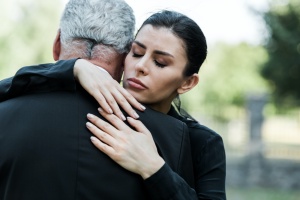 Losing a loved one is devastating under any circumstances, but when their death was caused by another party’s negligence or irresponsible actions, it can create additional anguish and stress. It’s classified as wrongful death when it falls within that category.
Losing a loved one is devastating under any circumstances, but when their death was caused by another party’s negligence or irresponsible actions, it can create additional anguish and stress. It’s classified as wrongful death when it falls within that category.
In many cases, losing a loved one can also cause economic distress, particularly if the deceased was the main contributor to household finances. As a surviving family member of a wrongful death victim, you may be able to seek compensation for your loss, whether your loved one’s death was accidental or intentional.
What Does Wrongful Death Mean?
Wrongful death claims are typically appropriate in situations where the victim would have had a valid claim for personal injury had they survived. It may be helpful to think of it as a personal injury claim in which the person who was injured cannot bring their own case to court, so their loved ones are filing it instead.
This usually entails a death resulting from a reckless, intentional, or negligent act on the part of another person, group, or business.
Examples include vehicle accidents, nursing home neglect, fatal slip and fall accidents, dangerous drugs, defective products, crime victims, medical malpractice, and workplace toxin exposure or accidents. Not every situation described here is considered wrongful death; an attorney can advise on the specifics of your case.
Wrongful Death Claims
 In Virginia, a wrongful death claim must be filed within two years of the date of the person’s death. After that time, the state’s statute of limitations will prevent the case from being heard in court. A wrongful death claim can be filed by the “statutory beneficiaries” of the deceased, which refers to certain family members or dependents.
In Virginia, a wrongful death claim must be filed within two years of the date of the person’s death. After that time, the state’s statute of limitations will prevent the case from being heard in court. A wrongful death claim can be filed by the “statutory beneficiaries” of the deceased, which refers to certain family members or dependents.
A surviving spouse and children or grandchildren have the initial right to file such a claim. If there are not any survivors in the category, the surviving parents and siblings of the deceased may file the suit. In the absence of these statutory beneficiaries, any family members who were entitled to inherit the individual’s estate according to the intestacy laws in Virginia may file a wrongful death claim.
When determining the loss of income and services, expert testimony may be used to help the court reach an accurate figure. In Virginia, there is no cap on the damages that can be awarded in a wrongful death claim, unless it involves medical malpractice. However, there is a cap on punitive damages.
Damages For Wrongful Death Claims
The damages in wrongful death claims often cover funeral and burial costs, medical bills that may have been paid prior to the person’s death, the loss of the financial support that the deceased individual would have provided had they lived in terms of the value of their lost wages and benefits, sorrow and mental anguish, punitive damages, and loss of companionship. It can also include compensation for services that the victim may have carried out for the surviving family, such as care, protection, and other domestic services.
Any compensation that is awarded may be distributed by the court to the surviving family members named in the claim as it sees fit. The damages for funeral costs and medical bills will be given directly to the creditors who carried out the services.
Speak To An Experienced Attorney
 If you have lost a loved one due to someone else’s negligence, speak to an experienced defense attorney who can navigate this traumatic situation with sensitivity and compassion. Because there is a strict deadline for filing this type of suit, it is important to move quickly. Get in touch with The Brown Firm today to learn more about your rights in your particular situation. You can reach us by phone at 703.828.0900 or by sending in an online contact form. We look forward to hearing from you.
If you have lost a loved one due to someone else’s negligence, speak to an experienced defense attorney who can navigate this traumatic situation with sensitivity and compassion. Because there is a strict deadline for filing this type of suit, it is important to move quickly. Get in touch with The Brown Firm today to learn more about your rights in your particular situation. You can reach us by phone at 703.828.0900 or by sending in an online contact form. We look forward to hearing from you.

